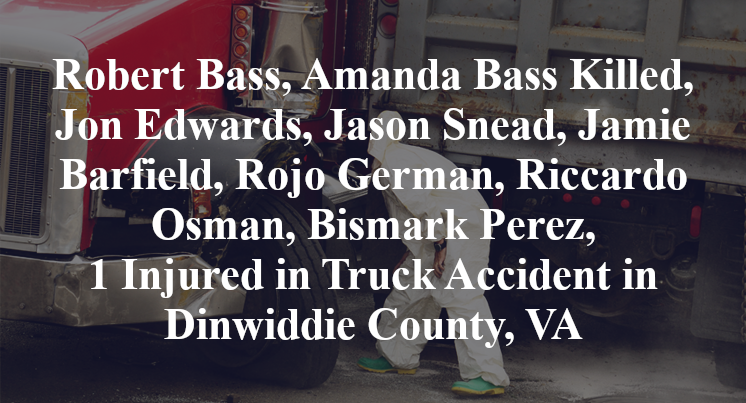Robert Bass, Amanda Bass Killed, Jon Edwards, Jason Snead, Jamie Barfield, Rojo German, Riccardo Osman, Bismark Perez, 1 Injured in Truck Accident in Dinwiddie County, VA
Dinwiddie County, VA — May 31, 2024, Robert Bass and Amanda Bass were killed and Jon Edwards, Jason Snead, Jamie Barfield, Rojo German, Riccardo Osman, and Bismark Perez were injured in a truck accident.
Initial details released by the Virginia State Police say that the crash happened along the interstate near Brunswick County at around 7:45 a.m.
According to officials, a tractor-trailer was approaching traffic and reportedly did not slow down. As a result, a chain-reaction multi-vehicle crash occurred. In that crash were 58-year-old Bobby Bass and 53-year-old Aimee Bass in a Kia Seltos. Both Bobby and Aimee Bass were killed in the accident.

Injured in the crash were 48-year-old Jon Brandon Edwards and 38-year-old Jason Snead in a Ford van, 40-year-old Jamie Nicole Barfield in a Jeep Patriot, and 43-year-old Rojo German, 53-year-old Riccardo Osman and 34-year-old Bismark Perez who were in a Ford F-250. The semi-truck driver also reportedly had injuries. Others reportedly were not transported from the scene.
Right now, the exact cause for the crash has yet to be confirmed. I wouldn't rule out something unusual or unavoidable without seeing clear evidence. For all we know, this was all due to a sudden medical issue, a manufacturer's defect, or something else the truck driver couldn't avoid. But more often than not, a commercial truck slamming into traffic is a sign that the truck driver made a huge mistake. Even when that's true, though, it's important to make sure authorities are asking a crucial question: was there an employer who could have prevented this from happening?
Here's why I say that. I've handled hundreds of commercial vehicle accidents, and it would surprise folks how often authorities fail to hold trucking companies accountable despite the fact it was their behavior that ultimately caused a serious crash. Even with common factors, like fatigue or distracted driving, a culture of unsafe work practices can encourage or otherwise allow truck drivers to behave recklessly.
For example, we had a case a while back where a truck driver was violating hours of service regulations and driving well over his allotted hours. That alone was a mistake worth addressing, and one for which that driver was not excused. That said, our investigations into his employer revealed a company practice of rewarding drivers who did as much work as they possibly could and met unreasonable delivery deadlines. It also ended up punishing those who prioritized safety and took mandated breaks by passing those drivers over when it came time for more work. In the end, it led to an environment where drivers would take risks on the road rather than risking their livelihood. It was all but inevitable people would get hurt.
While that's just one example, this is a common issue in the trucking industry. Any experienced, responsible trucker will attest to the fact some companies out there simply don't give a damn about the safety of others—or even their own drivers, for that matter. That's why a proper investigation has to consider all possible contributing factors after a crash like this. That's as true for mistakes in the moments leading up to the crash as for mistakes that happened long before the truck driver hit the road.
I certainly don't know about this specific crash, who was involved, or why it happened any more than others in the public reading the same news stories I am. But I do know that the victims and families I've helped after a deadly commercial truck wreck didn't just one someone to point their finger at. They wanted accountability from those who harmed them. That can't happen if someone is let off the hook simply because no one bothered looking for them. Are authorities being broad enough in their investigations to ensure that doesn't happen here?

“These are essential reads for anyone dealing with the aftermath of a truck wreck”– Attorney Cory Carlson